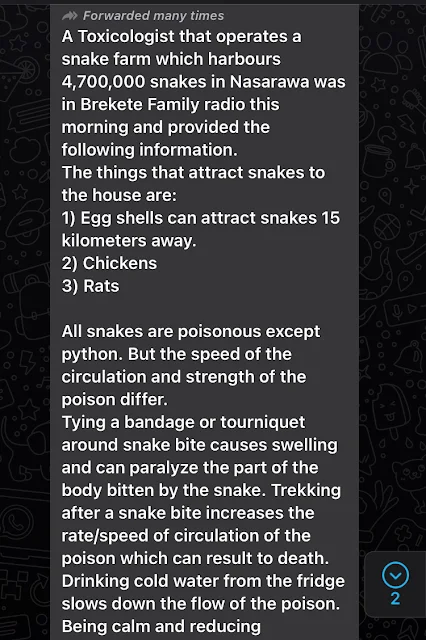According to toxicologists and reptile experts, including those at reputable institutions such as the World Health Organization (WHO) and the Centers for Disease Control and Prevention (CDC), wall geckos, including the Tsaka gecko, are not venomous or poisonous to humans. They are harmless creatures that play a beneficial role in controlling insect populations, particularly mosquitoes.
CLAIM 1: Egg shells can attract snakes 15 kilometres away.
VERDICT: False
SOURCE: According to wildlife experts and herpetologists, there is no scientific evidence to support the claim that eggshells can attract snakes from such a long distance. Snakes are attracted to sources of food, shelter, and warmth, rather than egg shells specifically. [Source: National Geographic - Snakes]
CLAIM 2: Chickens attract snakes.
VERDICT: Partially true
SOURCE: Snakes are known to prey on small animals, including chickens. However, the presence of chickens alone is not a guaranteed attraction for snakes. Factors such as the availability of other food sources and suitable habitats also play a role. [Source: University of Florida - Snakes in the Garden]
CLAIM 3: Rats attract snakes.
VERDICT: Partially true
SOURCE: Snakes are natural predators of rats and may be attracted to areas with a high rat population. However, snakes also feed on a variety of other prey, and the presence of rats alone is not the sole factor determining snake attraction. [Source: University of Nebraska - Snakes and Rat Control]
CLAIM 4: All snakes are poisonous except pythons.
VERDICT: False
SOURCE: This claim is incorrect. While it is true that many snake species are venomous, not all snakes possess venom. Python species are non-venomous constrictor snakes and do not produce venom. However, there are other non-venomous snake species as well. [Source: San Diego Zoo - Snake Facts]
CLAIM 5: Tying a bandage or tourniquet around a snake bite causes swelling and can paralyze the bitten area.
VERDICT: False
SOURCE: Applying a tourniquet or bandage tightly around a snake bite is not recommended. It can restrict blood flow and cause tissue damage, leading to complications. Immediate medical attention and proper first aid measures, such as keeping the victim calm and immobile, are crucial. [Source: World Health Organization - Snakebite Envenoming]
CLAIM 6: Drinking cold water from the fridge slows down the flow of snake venom.
VERDICT: False
SOURCE: There is no scientific evidence to support the claim that drinking cold water from the fridge slows down the circulation of snake venom. Prompt medical assistance is essential in cases of snakebite, and relying solely on home remedies or cold water will not counteract the effects of the venom. [Source: Australian Venom Research Unit - First Aid for Snakebite]
CLAIM 7: Chewing pawpaw leaf and swallowing the liquid stops the flow of snake poison until treatment is received.
VERDICT: False
SOURCE: While traditional remedies like chewing pawpaw leaves are commonly believed to have antidotal properties, there is insufficient scientific evidence to support their effectiveness in stopping the flow of snake venom. Immediate medical attention is crucial in treating snakebites. [Source: African Journal of Traditional, Complementary and Alternative Medicines - Management of Snakebite]
CLAIM 8: Snake venom entering the nose can cause death in minutes.
VERDICT: False
SOURCE: Snake venom entering the nose is indeed dangerous, but the claim that death can occur within minutes is an exaggeration. The severity and effects of snake venom vary depending on the species. Seeking immediate medical help is crucial in any case of snakebite. [Source: University of California, San Diego - Snakebite]
CLAIM 9: Wall geckos are deadlier than snakes. Using a toothbrush contaminated by a wall gecko without washing it can cause death.
VERDICT: False
SOURCE: There is no scientific evidence to support the claim that wall geckos (Tsaka) are deadlier than snakes or that using a toothbrush contaminated by a wall gecko without washing it can cause death. Wall geckos are harmless reptiles that primarily feed on insects and pose no significant threat to humans. [Source: African Journal of Herpetology - Geckos]
The claims circulating on social media regarding snakes, snakebites, and wall geckos contain misinformation and exaggerations. It is important to rely on verified sources and scientific evidence when assessing such claims. Snakes are attracted to various factors including food, shelter, and warmth, while wall geckos pose no danger to humans. Immediate medical attention and proper first aid measures are crucial in cases of snakebites. Prime 9ja Online aims to deliver factual news and curb misinformation, ensuring the public has accurate information.






